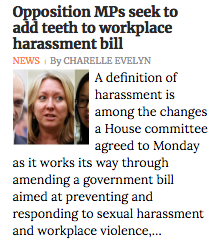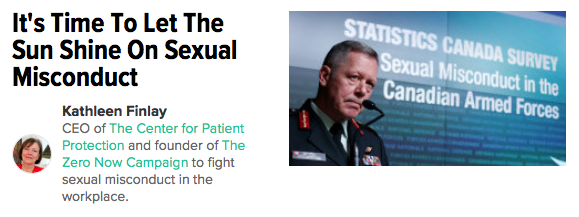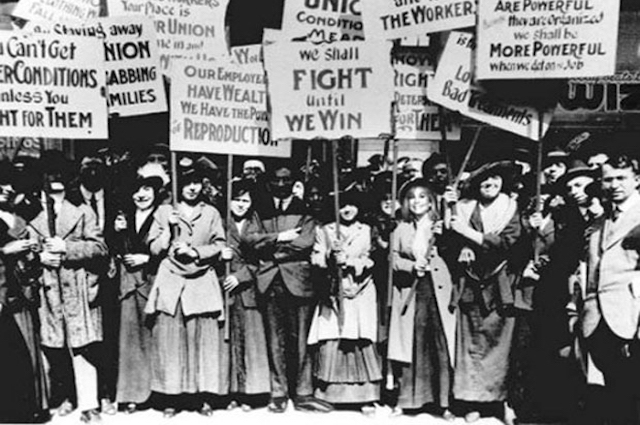Kathleen Finlay Interviewed in Hill Times
ZeroNow’s founder, Kathleen Finlay, was interviewed in the Hill Times (April 4, 2018) on the federal government’s new anti-harassment legislation (Bill C-65).

ZeroNow’s founder, Kathleen Finlay, was interviewed in the Hill Times (April 4, 2018) on the federal government’s new anti-harassment legislation (Bill C-65).

The Canadian government is in the midst of updating its laws to more fully address sexual harassment in federally regulated workplaces, and to finally bring parliamentary and political staff under such protections. Known as Bill C-65, the proposed law moves a step forward — forward into the last century perhaps — in setting out practices, such as the obligation to investigate complaints, that have long been established elsewhere. But it falls far short of being the 21st century model it should be, and what this period of “reckoning” demands.

We’ve seen an almost endless procession of headlines chronicling the downfall of luminaries over allegations of sexual misconduct. Actors, producers, broadcasters, comedians and even chefs have all walked into this ginormous propeller of public outrage.
Then there are the high-profile politicians in the U.S. Congress. Closer to home, and in the span of 24 hours, Ontario PC leader Patrick Brown, Nova Scotia Conservative leader Jamie Baillie and federal Liberal cabinet minister Kent Hehr all abruptly resigned following allegations of improper behaviour.
As scandals on Parliament Hill reveal, our public institutions could be among the biggest offenders.
But when it comes to sexual misconduct, we haven’t even begun to tally what goes on in the everyday workplace, where millions of women face this epidemic without the benefit of cameras or reporters to witness the damage.
Want to really change this picture? Start here: since governments set the rules for the rest of the workplace and are among our largest employers, they should take the lead in setting the right tone — a zero-tolerance tone — for sexual misconduct. But as scandals on Parliament Hill (not to mention in the RCMP and Canadian military) reveal, our public institutions could be among the biggest offenders.
I’ve seen that movie.
It began when I was sexually assaulted by a prominent government official(never investigated) at a conference of Canadian securities regulators. It ended with the destruction of my 20-year career after I complained about sexual harassment on the part of my boss (also never investigated) at the government agency where I worked.
Leaving a job is not the end of the sexual misconduct nightmare. It’s only the beginning.
What happened next is what occurs in too many cases where the media are not there to shine their big spotlight: I left. My harasser stayed.
Here’s something else I didn’t know: leaving a job is not the end of the sexual misconduct nightmare. It’s only the beginning. Every opportunity I pursued for employment in my areas of expertise — or anywhere in the government for that matter — led to a dead end.
I had an excellent CV and a stellar educational background; still, I couldn’t even get an interview for advertised government positions I held straight out of university two decades earlier. On the other hand, a number of private-sector interviews went so well that I was frequently asked “How soon can you start?” But when they went back to my former employer for references, as every prospective employer does, I never heard from them again, and my calls and emails were left unreturned.
The reprisal writing was clearly on the job-search wall. My repeated pleas to the highest level of the government to end this ongoing retaliation were met with silence. So much for government setting the example.
Women often encounter retaliation when they stand up against sexual misconduct. It can be career-ending. That’s a big reason why so many, especially those in low-skill, low-wage jobs who live from paycheque to paycheque, are hostage to abusive bosses and are too afraid to speak out. Unfortunately, lawmakers don’t want to turn retaliation into a criminal matter, as I have long advocated. That could make a big difference in curbing reprisals.
Over the years, I’ve heard from hundreds of women — many from the public sector — who wanted to share their stories. Every one of them told me that if they had known about the personal pain and financial costs of pursuing a complaint, they would not have spoken out. Most were never able to resume their chosen careers and recount shocking stories about vindictive bosses and employers. Financial problems were common. Many suffered disabling health issues and some even considered suicide.
Society can’t afford to see so many talented women frozen out of the workplace.
Here’s part of an action plan for governments developed by The Zero Now Campaign, the advocacy group I founded, that will make a difference in the real-world workplace. The private sector is more than welcome to join in.
It’s said that humans, like subatomic particles, behave differently when they’re being watched. But when it comes to dealing with sexual misconduct in the workplace, there is absolutely no transparency. Right now, we have no idea how many women have filed complaints, for example, in the RCMP, on Parliament Hill or at Queen’s Park.
It’s time for a sunshine law requiring every public law-making and legislative body, as well as all taxpayer-funded departments, boards, commissions, agencies, universities and hospitals to publish annual statistics on the number of incidents reported to them, the outcome of each complaint and any financial settlement paid.
It’s time for a high-profile campaign by our best employers, especially public sector employers, to hire the survivors.
Women who report sexual misconduct often find themselves forced to sign an NDA at various stages of an investigation. These legal devices amount to a gag order that protects offenders and preserves the reputation of their frequently enabling organizations.
They allow too many employers to hide behind a cloak of invisibility and treat sexual misconduct as just another cost of doing business. They make it impossible for women to speak out and protect other women, or to explain to a prospective employer why job references have been tainted.
Despite what you read about the recent downfall of figures like broadcasting legend Charlie Rose and former U.S. Senator Al Franken, in typical cases it is the victim of sexual harassment who winds up leaving the organization. As I have been advocating for the past several years, it’s time for a high-profile campaign by our best employers, especially public sector employers, to hire the survivors whose lives and careers have been shattered because of sexual misconduct. I call it Hire Us Back.
If this is really a period of reckoning, we’ll need more than shocking headlines and glamorous black-dress galas. We need change that can really be seen and felt among the forgotten women in the everyday workplace.
Published in The Huffington Post February 9, 2018

An important survey on sexual harassment in Canada conducted by veteran B.C. pollster Angus Reid confirms what countless women have discovered and many victims have told me: most employers don’t take sexual harassment seriously. Investigations are often a sham, if they occur at all. This is just one more piece of evidence in a growing chain that demonstrates the ineffectiveness of current sexual harassment laws. Here are some of the poll’s findings:
Most people who experience workplace sexual harassment or non-consensual sexual contact in Canada never report it to their employer, to a large degree out of fear or shame, a new survey suggests. For those who do report it, there is a 60 per cent chance their employer won’t take any concrete action or will dismiss their complaint, the findings suggest.
The survey also shows that there are a number of reasons why most women are reluctant to report an incident. Fear of creating a negative impression in the mind of the employer is prominent, as is the worry that complainants will be ostracized in the organization ⎯ or worse.
The survey mirrors my experience to a tee. The government agency I worked for ignored initial incidents of sexual harassment and discouraged me from reporting them. When the situation became unbearable, I made a formal complaint. But the organization refused to follow its own anti-harassment policy. There was no independent investigation. In fact, everything that an enlightened workplace is supposed to do to protect women and properly investigate allegations of sexual harassment this arm of the Ontario government refused to do and did the exact opposite instead.
As long as it is left to employers to decide whether or not they will take sexual harassment allegations seriously women will not be as safe as they need to be.
Years later, following a lengthy investigation by the human rights tribunal and a settlement, my former government employer continues to permit retaliation that makes it impossible for me to obtain employment elsewhere in the public service where I worked for more than 20 years. Though I have pleaded with its current management to stop the reprisals, once again they refused to allow any independent investigation. They turned the matter over to a high-priced outside lawyer who said he would investigate it. He pronounced his government client spotless. And then threatened to sue me.
Sadly, Angus Reid’s research confirms that my experience, and similar ones shared with me by many women, are not uncommon. As long as it is left to employers to decide whether or not they will take sexual harassment allegations seriously and whether an independent investigation will be conducted, women — and their careers, health, livelihood and dignity — will not be as safe as they need to be.
It’s no longer a matter of discretion on the part of employers to permit smoking in the workplace. Why? Because its effects are known to be toxic. Sexual harassment can be no less toxic to those affected.
It’s time our political leaders got that message. They need to stop allowing employers, including governments themselves, to turn a blind eye when sexual harassment and reprisals occur, and put in place tough laws that really protect women.
Published in The Huffington Post, December 11, 2014
THE HUFFINGTON POST
By Kathleen Finlay
 In an ironic twist, former CBC host Jian Ghomeshi has single-handedly done more to bring attention to the scourge of sexual harassment than any public awareness campaign could ever do. Federal Liberal leader Justin Trudeau has also performed an unexpected service in showing that women, even as members of parliament, are reluctant to report unwelcome conduct in the workplace. The celebrities have done their jobs, unintended or otherwise, in opening up a national conversation on a too-long-overlooked subject. Now the rest of us have to roll up our sleeves and get this 800-pound sexual harassment gorilla out of the room.
In an ironic twist, former CBC host Jian Ghomeshi has single-handedly done more to bring attention to the scourge of sexual harassment than any public awareness campaign could ever do. Federal Liberal leader Justin Trudeau has also performed an unexpected service in showing that women, even as members of parliament, are reluctant to report unwelcome conduct in the workplace. The celebrities have done their jobs, unintended or otherwise, in opening up a national conversation on a too-long-overlooked subject. Now the rest of us have to roll up our sleeves and get this 800-pound sexual harassment gorilla out of the room.
Two years ago in The Huffington Post, I proposed that Canada’s lawmakers give women an opportunity to come forward with their views and experiences on sexual harassment.
Two years ago in The Huffington Post, I proposed that Canada’s lawmakers give women an opportunity to come forward with their views and experiences on sexual harassment. Since that time, I have heard from scores of women on the subject. Each story is different, of course, but they speak with a remarkably singular voice when it comes to the culture around sexual harassment and how the system that is supposed to protect them has let them down.
Typically, most women deal with harassment and abuse out of the spotlight and in the shadows. They don’t have high-profile bosses vulnerable to the threat of public exposure. They can’t afford high-priced lawyers to take up their cause. And the alarming fact is that, like sexual assault, most incidents of workplace harassment go unreported.
In France, sexual harassment has been made a criminal offense. In Canada, a traffic infraction can spin the wheels of justice faster and with a more punishing outcome than most sexual harassment cases will ever see.
But the impact on victims can be sudden and swift. Many women who do come forward after experiencing sexual harassment say they were quickly abandoned by their friends and colleagues at work, especially if the offending party held a senior position in the organization. A sense of organizational ostracism is common.
Add to this, the company lawyers who can be quick to descend on the victim, the prospect of private investigators being hired by an employer to dig up discrediting information, and the slow clattering train ride of human rights tribunals that can go on for years (four, in my case), and you don’t need to wonder why more women don’t report these incidents. You have to ask why any come forward in the first place.
Even when a woman succeeds in bringing her harasser to justice after an internal investigation or human rights complaint, the consequences of her ordeal can be life-altering.
Political leaders need to take sexual misconduct subject seriously. There has been little evidence of that to date.
Reprisals are common in sexual harassment incidents — by the perpetrators, their organizations and prospective employers. If a woman decides to leave the organization because of what she perceives to be a lingering toxic atmosphere, she will often have problems finding another job. Why? Nobody gets a good reference from an employer that was the subject of a sexual harassment complaint. Yet, human rights tribunals and the courts have made reprisals for asserting the right to be free from sexual harassment one of the most difficult types of discrimination to prove.
What’s the solution? First and foremost, political leaders need to take sexual misconduct subject seriously. There has been little evidence of that to date. Fortunately, the Ghomeshi scandal may be shifting the political landscape, too.
This week, the Progressive Conservative party in Ontario’s legislature will propose the creation of a select committee to investigate sexual harassment in the workplace. So far, Premier Kathleen Wynne has been lukewarm to the idea and has not yet said she will support it. Without the blessing of Ontario’s first woman premier, the idea will fail. It’s too important to let that happen.
Ontario’s existing regime to combat sexual harassment was crafted in the previous century and probably belongs more in the one before that. But the outrage of recent weeks is causing the public to demand like never before strong political leadership that will make the workplace safer.
Listening to the voices of women and what they think needs to be done to protect them from further trauma and abuse is an indispensable step in any genuine process of reform.
A society that truly respects its daughter, sisters and wives owes them no less.
First published in The Huffington Post, November 24, 2014.

THE HUFFINGTON POST
 Recent events in the United States have seen the long-settled debate over the right of women to have access to birth control bizarrely reopened amid congressional side shows and talk show host tirades. Many are left wondering how far the U.S. has come on issues that are vital to women. But how far has Canada come?
Recent events in the United States have seen the long-settled debate over the right of women to have access to birth control bizarrely reopened amid congressional side shows and talk show host tirades. Many are left wondering how far the U.S. has come on issues that are vital to women. But how far has Canada come?
Claims of sexual harassment are rampant in the RCMP, with more than 1000 cases filed since 2005, prompting some to question the culture of the nation’s foremost law enforcement symbol. My own experience a few years ago, which ironically involved a high-profile regulatory agency in Ontario, also offers an instructive lesson on what can happen to women when they demand a workplace free from sexual harassment and reprisals.
In my case, the organization ignored its own anti-harassment policy and allowed the subject of my complaint, who just happened to be my boss, to decide the outcome. Predictably, I was tarred as the offender and his solution was to demote me. I went to the Ontario Human Rights Commission, which, after fumbling the case for several years, finally gave my concerns serious attention. It was at that point that my employer offered me a financial settlement that also involved leaving my job and withdrawing my complaint. I agreed. What I didn’t realize was that the professional career I had worked hard to build over more than 20 years was effectively ended too.
Most women who have experienced the aftermath of a sexual harassment complaint know what’s going on. It’s payback time.
Prospective employers seem impressed with my resume at the outset. Meetings always end on a positive note. But the problems begin when they go back to my previous employer even for an informal reference. When only days earlier I had been asked how quickly I could start, what greets me afterward is stone silence. Emails are no longer returned. Most women who have experienced the aftermath of a sexual harassment complaint know what’s going on. It’s payback time. Years later, it is still impossible to find a job in my field.
I’ve pleaded with my former employer to stop maligning me so I can work again. Recently, the organization responded by retaining a prominent lawyer who threatened me with what amounts to financial ruin if I reveal the circumstances that caused me to leave my position or who was involved. I can’t even be up front with potential employers about what occurred. All they hear is a very one-sided version of events from an organization with a long memory and a large axe to grind. Women don’t get a lot of career boosts when unwanted circumstances have forced them to stand up to power and tell it to back off.
Unfortunately, recourse in such situations is virtually non-existent. The courts are no place for an ordinary individual to go up against a major organization with deep pockets. Human rights commissions are agonizingly slow. And for all their self-serving pronouncements, public policy leaders appear to have little appetite for addressing the shortcomings that still leave too many women dealing with toxic bosses.
Career ostracism and reprisals are an almost universal consequence of confronting sexual harassment
The Centre for Research on Violence Against Women and Children found that Canadian women who filed sexual harassment complaints “experience a negative effect on their work and personal lives.” As one woman who participated in the research reported, “Your past employer might not give you a good reference for a job. They might label you as a troublemaker.”
Career ostracism and reprisals are an almost universal consequence of confronting sexual harassment, according to a number of international studies. I’ve talked with many women about their experiences of being estranged figures in the workplace today. Frustration, financial horrors, and depression are common outcomes.
From single mothers struggling to make a better life to women defending their rights to be free of bosses channeling the slap-on-the-behind Mad Men era and baby boomers who are forced to make a Hobson’s choice between caring for an elderly parent and carrying on with their careers, the workplace can be as cold, distant, and inflexible in the 21st century as it was in the last.
Women pay the most immediate price for this. But ultimately it is all society that bears the cost when it permits those who can contribute to a productive economy, and uphold values of compassion and dignity at the same time, to be marginalized. It’s a subject that could benefit from some serious inquiry by Canada’s lawmakers. The room would be filled with women who have a lot of value to add.
Originally published in The Huffington Post, March 8, 2012